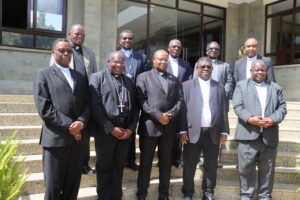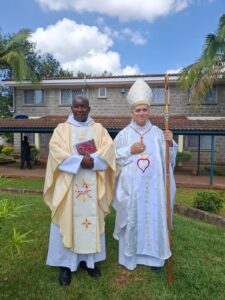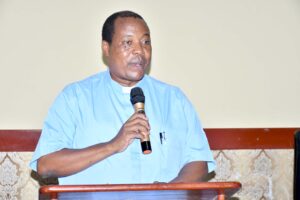KENYA: New Book Exposing Challenges Facing Higher Education Highlights Need for Quality Assurance System
Fr. Dr. Joseph Oduor Afulo, SJ signing newly launched book
Sr. Jecinter Antoinette Okoth, FSSA
Moved with the fact that through questioning we become a thinking generation who can come up with new ideas to develop a society, the author of a newly launched book “Challenges Facing Higher Education in East Africa,” Dr Joseph Oduor Afulo SJ emphasizes that education can be valuable if “effectively and efficiently managed” so beneficiaries can be innovative and resourceful in the society.
Speaking during the launch Tuesday, May 3, at Jesuits Loyola house in Nairobi, Kenya, Fr. Afulo the Vice Chancellor of Arrupe Jesuit University in Zimbabwe’s capital, Harare, underscores that the purpose of the five –chapter book is to “trigger thoughts on higher education.”
Focusing on the evolution of education right from the colonial era to date in the three countries of East Africa: Kenya, Tanzania and Uganda, the Kenyan cleric educator who has served in various educational institutions including Hekima University College, Catholic University of Eastern Africa (CUEA) and Lwak Girls high school among others notes that there has been “Massification in higher education institutions and limited finances to support higher education development , including research and publication.”
This he says, is a great challenge for institutions of higher education in “coping with demands for quality, access and equity.”
In his observation, Fr Afulo who is former Provincial Superior of the Eastern Africa Province of the Society of Jesus underscores that higher education has therefore become “more commercial including the unethical practices of leakage and compromised education.”
“The efforts of educators are always focused on providing an ideal education, a type of education that frees the student to stand on his or her own feet,” The author of the book said during the Tuesday launch and lamented posing questions, “Why do the parents always look for schools where several students pass examination and they equate it with good school? Why is it that many teachers find it easy to couch students after teaching them partially during the normal lessons? and how is it that many teachers have resorted to teach to the test?”
He links his concerns to the education system in the East African nations stressing that “these questions require authentic diagnosis, consistent monitoring, and objective evaluation.” Additionally, “They demand a longitudinal process that requires reliability, persistence, and dependability.”
 Echoing the author’s observation during the launch, Dr. John Mugo who gave a critical review of the book, acknowledges that “inefficiencies and the learning crisis, right from foundation, has weakened higher education.” Besides, “when teachers lack the skills and the intrinsic motivation needed to teach and inspire children, and when the educated parents lack the values and the life skills that they should pass over to their children,” education is compromised.
Echoing the author’s observation during the launch, Dr. John Mugo who gave a critical review of the book, acknowledges that “inefficiencies and the learning crisis, right from foundation, has weakened higher education.” Besides, “when teachers lack the skills and the intrinsic motivation needed to teach and inspire children, and when the educated parents lack the values and the life skills that they should pass over to their children,” education is compromised.
Expounding further on the book, Dr. Mugo the executive director of Zizi Afrique foundation and a researcher for nearly two decades, reveals that, “Interference with autonomy and academic freedom of the universities has often resulted in brain drains,” and he suggest that “University education should not just serve the job market, but the holistic needs of society, determining even future directions and things that cannot be conceived by the masses right now.”
Additionally Dr. Mugo who doubles as Coordinator of Catholic Academic Exchange Service (KAAD), Kenya stresses that “The most difficult challenge facing the university is how to change the students’ mindset from the public-sector mentality of dependency and wastefulness to the private-sector mentality of entrepreneurship frugality and value for money.”
He agrees with the writer that the ultimate relevance of university education is the creation of an inquisitive, critical mind. At the same time he observes that there is massification of education but still inequities in access.”


